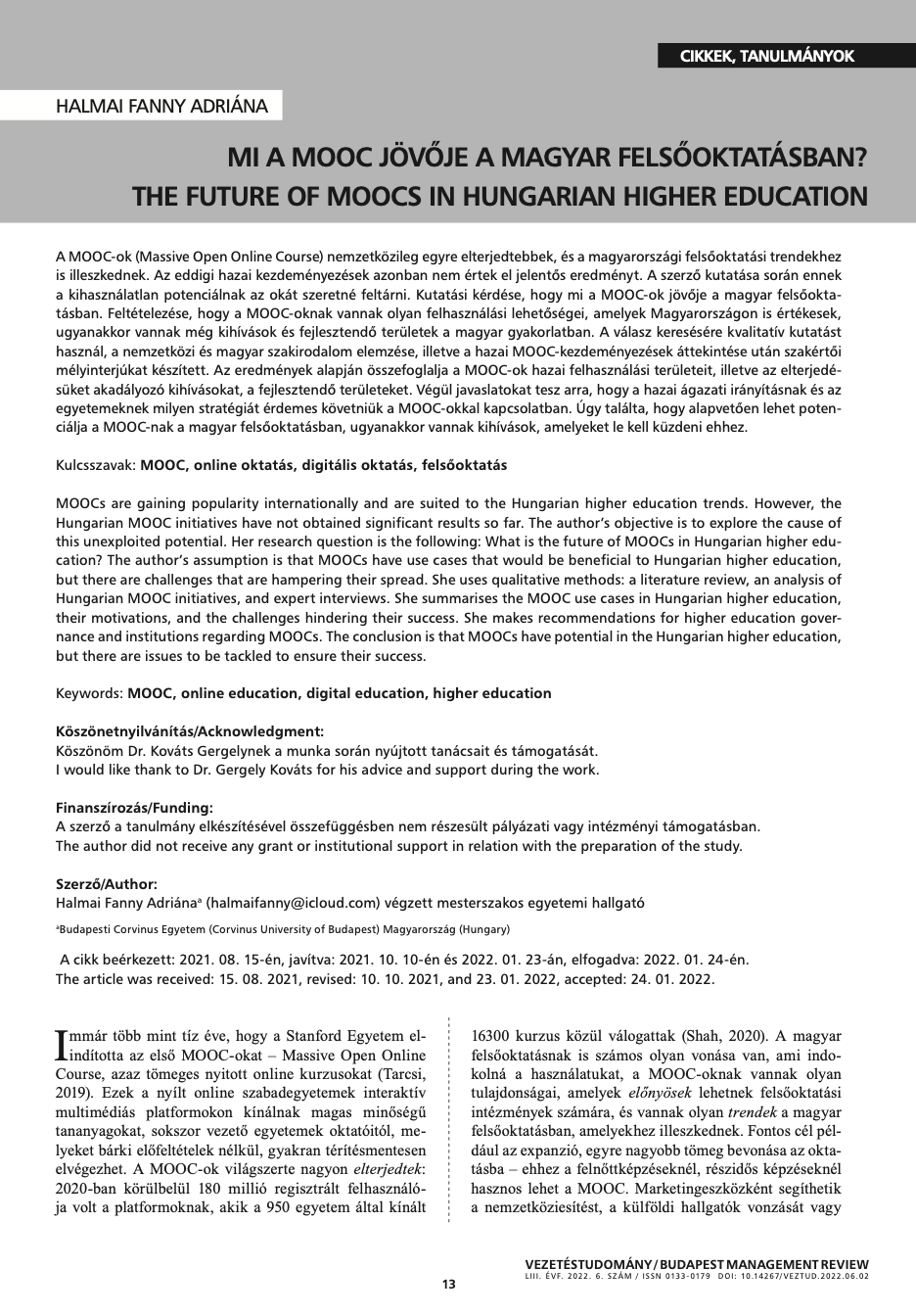Mi a MOOC jövője a magyar felsőoktatásban?
DOI:
https://doi.org/10.14267/VEZTUD.2022.06.02Keywords:
MOOC, online education, digital education, higher educationAbstract
MOOCs are gaining popularity internationally and are suited to the Hungarian higher education trends. However, the Hungarian MOOC initiatives have not obtained significant results so far. The author’s objective is to explore the cause of this unexploited potential. Her research question is the following: What is the future of MOOCs in Hungarian higher education? The author’s assumption is that MOOCs have use cases that would be beneficial to Hungarian higher education, but there are challenges that are hampering their spread. She uses qualitative methods: a literature review, an analysis of Hungarian MOOC initiatives, and expert interviews. She summarises the MOOC use cases in Hungarian higher education, their motivations, and the challenges hindering their success. She makes recommendations for higher education governance and institutions regarding MOOCs. The conclusion is that MOOCs have potential in the Hungarian higher education, but there are issues to be tackled to ensure their success.
Downloads
References
AlQaidoom, H., & Shah, A. (2020). The Role of MOOC in Higher Education during Coronavirus Pandemic: A Systematic Review. International Journal of English and Education, 9(4), 141-151.
Bacsich, P. (2016). Business Models for Opening up Education: Sustainability of MOOCs, OER and related online education approaches in higher education in Europe. https://doi.org/10.13140/RG.2.1.4125.7369
Baturay, M. H. (2015). An overview of the world of MOOCs. Procedia – Social and Behavioral Sciences, 174, 427– 433. https://doi.org/10.1016/j.sbspro.2015.01.685
Belleflamme, P., & Jacqmin, J. (2016). An Economic Appraisal of MOOC Platforms: Business Models and Impacts on Higher Education. CESifo Economic Studies, 62(1), 148–169. https://doi.org/10.1093/cesifo/ifv016
Benedek, A., Molnár, G., & Sik, D. (2016). A MOOC-orientált fejlesztések esélyei Magyarországon.
Bethlendi, A., & Szőcs, Á. (2020). Online felsőoktatási platformok üzleti modelljei felsőoktatási intézmények számára – OOC-ok és egyetemek nemzetközi együttműködéseinek bemutatása. In XIV. Soproni Pénzügyi Napok „Gazdaságvédelem és pénzügyi kiutak” pénzügyi, adózási és számviteli szakmai és tudományos konferencia konferenciakötet (pp. 6-15.). Sopron: A Soproni Felsőoktatásért Alapítvány.
Casanova, A. M. (2020). Case Study: Coursera. International Finance Corporation.
EDUCAUSE. (2012). What Campus Leaders Need to Know About MOOCs. 3.
ELTE. (2020). MOOC – Nyílt kurzusok az ELTE-n.
Forgó S., & Racsko R. (2020). A pedagógiai rendszertervezés és újmédia alapú MOOC-kurzus jellemzői a felsőoktatásban. In Agria Media 2014: „A humán teljesítmény-támogató technológia kora következik; tudásteremtés, értékőrzés, munkavégzés digitális eszközökkel.” (pp. 365–378). Eger: Eszterházy Károly Főiskola Líceum Kiadó.
Gaskell, A., & Mills, R. (2014). The quality and reputation of open, distance and e-learning: What are the challenges? Open Learning: The Journal of Open, Distance and e-Learning, 29(3), 190–205. https://doi.org/10.1080/02680513.2014.993603
Grainger, B. (2013). Massive open online course (MOOC) report 2013.
Haggard, S., Daniel, J., Cano, E., & Gisbert, M. (2015). The Future of MOOCs: Adaptive Learning or Business Model? RUSC. Universities and Knowledge Society Journal, 12, 64. https://doi.org/10.7238/rusc.v12i1.2475
Hollands, F. M., & Tirthali, D. (2014). MOOCs: Expectations and Reality. Center for Benefit-Cost Studies of Education, Teachers College, Columbia University, NY.
Horváth D., Cosovan A., Horváth D., & Lachin N. (2018). Tanulás-munka interface. A valós idejű találkozások jelentősége a digitális oktatási környezetben. Vezetéstudomány, 49(12), 67–77. https://doi.org/10.14267/VEZTUD.2018.12.08
Jordan, K. (2015). Massive open online course completion rates revisited: Assessment, length and attrition. The International Review of Research in Open and Distributed Learning, 16(3), 341-358. https://doi.org/10.19173/irrodl.v16i3.2112
Kluijf hout, E., Henderikx, P., & Ubachs, G. (2019). MOOC status in European HEIs—With special reference to opening up education for refugees. European Association of Distance Teaching Universities (EADTU).
K-MOOC. (2021). Kurzuskatalógus: Kurzuskatalógus. Budapest Kárpát-Medencei Online Oktatási Centrum. https://www.kmooc.uni-obuda.hu/
KSH. (2020a). STADAT – 2.6.1. A költségvetés oktatási kiadásai (2001–).
KSH. (2020b). STADAT – 2.6.11. Felsőoktatás (1990–).
Literat, I. (2015). Implications of massive open online courses for higher education: Mitigating or reifying educational inequities? Higher Education Research & Development, 34(6), 1164–1177. https://doi.org/10.1080/07294360.2015.1024624
Liyanagunawardena, T. R., Lundqvist, K., Mitchell, R., Warburton, S., & Williams, S. A. (2019). A MOOC Taxonomy Based on Classification Schemes of MOOCs. European Journal of Open, Distance and E-Learning, 22(1), 85–103. https://doi.org/10.2478/eurodl-2019-0006
Maxwell, J. A. (2012). Qualitative research design: An interactive approach. Thousand Oaks: Sage Publications.
MeMOOC. (2021). Kurzusok | MeMOOC
Nagy V. (2016). E-learning ABC. Vezetéstudomány, 47(12), 6–15. https://doi.org/10.14267/VEZTUD.2016.12.01
Namestovski, Ž., Glušac, D., Esztelecki, P., Kőrösi, G., & Major, L. (2017). Tapasztalatok három saját készítésű MOOC kapcsán – A tervezéstől a kiértékelésig. Információs Társadalom, 15, 63-83. https://doi.org/10.22503/inftars.XV.2015.3.4
Namestovski, Ž., Kőrösi, G., & Esztelecki, P. (2014). Az online tanulás lehetőségei és nehézségei.
O’Prey, P. (2013). Massive open online courses: Higher education’s digital moment? Universities UK.
Osterwalder, A., & Pigneur, Y. (2010). Business model generation: A handbook for visionaries, game changers, and challengers. Chichester: John Wiley & Sons.
Shah, D. (2020). By The Numbers: MOOCs in 2020 — Class Central. Class Central.
Sharrock, G. (2015). Making sense of the MOOCs debate. Journal of Higher Education Policy and Management, 37(5), 597–609. https://doi.org/10.1080/1360080X.2015.1079399
SZTE. (2020). Coursera for SZTE | Mi a Coursera for SZTE?
Tarcsi, L. (2019). Hazai MOOC portálok – áttekintés. Opus et Educatio, 6(1), Article 1. https://doi.org/10.3311/ope.293
Webuni. (2021). Képzések. Webuni.
Wulf, J., Blohm, I., Leimeister, J. M., & Brenner, W. (2014). Massive Open Online Courses. Business & Information Systems Engineering, 6(2), 111–114. https://doi.org/10.1007/s12599-014-0313-9
Yuan, L., & Powell, S. (2013). MOOCs and open education: Implications for higher education | VOCEDplus, the international tertiary education and research database. CETIS Centre for Educational Technology and Interoperability Standards.

Downloads
Published
How to Cite
Issue
Section
License
Copyright (c) 2022 Vezetéstudomány / Budapest Management Review

This work is licensed under a Creative Commons Attribution 4.0 International License.
Authors assign copyright to Vezetéstudomány / Budapest Management Review. Authors are responsible for permission to reproduce copyright material from other sources.

